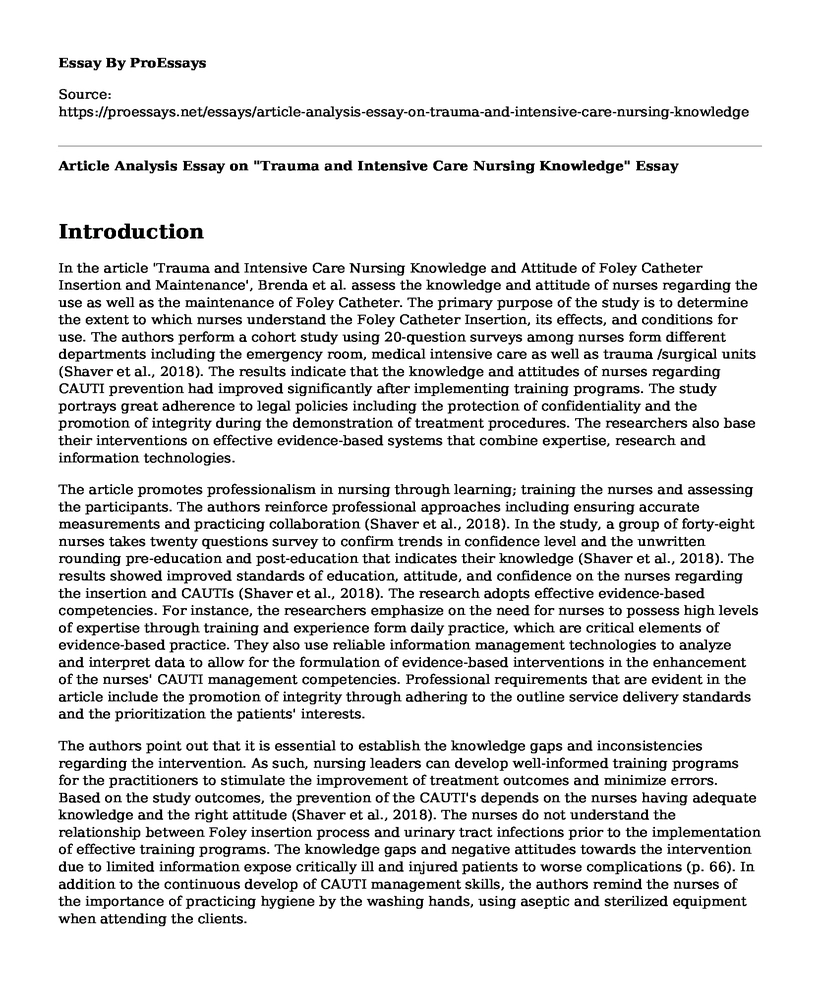Introduction
In the article 'Trauma and Intensive Care Nursing Knowledge and Attitude of Foley Catheter Insertion and Maintenance', Brenda et al. assess the knowledge and attitude of nurses regarding the use as well as the maintenance of Foley Catheter. The primary purpose of the study is to determine the extent to which nurses understand the Foley Catheter Insertion, its effects, and conditions for use. The authors perform a cohort study using 20-question surveys among nurses form different departments including the emergency room, medical intensive care as well as trauma /surgical units (Shaver et al., 2018). The results indicate that the knowledge and attitudes of nurses regarding CAUTI prevention had improved significantly after implementing training programs. The study portrays great adherence to legal policies including the protection of confidentiality and the promotion of integrity during the demonstration of treatment procedures. The researchers also base their interventions on effective evidence-based systems that combine expertise, research and information technologies.
The article promotes professionalism in nursing through learning; training the nurses and assessing the participants. The authors reinforce professional approaches including ensuring accurate measurements and practicing collaboration (Shaver et al., 2018). In the study, a group of forty-eight nurses takes twenty questions survey to confirm trends in confidence level and the unwritten rounding pre-education and post-education that indicates their knowledge (Shaver et al., 2018). The results showed improved standards of education, attitude, and confidence on the nurses regarding the insertion and CAUTIs (Shaver et al., 2018). The research adopts effective evidence-based competencies. For instance, the researchers emphasize on the need for nurses to possess high levels of expertise through training and experience form daily practice, which are critical elements of evidence-based practice. They also use reliable information management technologies to analyze and interpret data to allow for the formulation of evidence-based interventions in the enhancement of the nurses' CAUTI management competencies. Professional requirements that are evident in the article include the promotion of integrity through adhering to the outline service delivery standards and the prioritization the patients' interests.
The authors point out that it is essential to establish the knowledge gaps and inconsistencies regarding the intervention. As such, nursing leaders can develop well-informed training programs for the practitioners to stimulate the improvement of treatment outcomes and minimize errors. Based on the study outcomes, the prevention of the CAUTI's depends on the nurses having adequate knowledge and the right attitude (Shaver et al., 2018). The nurses do not understand the relationship between Foley insertion process and urinary tract infections prior to the implementation of effective training programs. The knowledge gaps and negative attitudes towards the intervention due to limited information expose critically ill and injured patients to worse complications (p. 66). In addition to the continuous develop of CAUTI management skills, the authors remind the nurses of the importance of practicing hygiene by the washing hands, using aseptic and sterilized equipment when attending the clients.
The article takes legal, regulatory and ethical principles into account to allow for the generation of credible findings. Regarding legal principles, they inform the participants about the purpose of the study and portray commitments to protect the confidentiality of their sensitive details. The practice also portrays adherence to ethical obligations because researchers need to safeguard the interests of the participants in public through the protection of vital details. The study also promotes the ethical principle of benevolence which requires practitioners to engage in tasks that maximize the patients' wellbeing. Nurses should initiate introduction of effective training programs to enable them acquire knowledge. Such knowledge will help them in avoiding the errors during the process and adopt suitable strategies of delivering care without harming the patients. The study is a meaningful source of guidance to nursing practitioners regarding the effective management of CAUTI's while integrating evidence-based, legal and ethical obligations into daily practice.
Reference
Shaver, B., Eyerly-Webb, S. A., Gibney, Z., Silverman, L., Pineda, C., & Solomon, R. J. (2018). Trauma and Intensive Care Nursing Knowledge and Attitude of Foley Catheter Insertion and Maintenance. Journal of Trauma Nursing, 25(1), 66-72.
Cite this page
Article Analysis Essay on "Trauma and Intensive Care Nursing Knowledge". (2022, Dec 14). Retrieved from https://proessays.net/essays/article-analysis-essay-on-trauma-and-intensive-care-nursing-knowledge
If you are the original author of this essay and no longer wish to have it published on the ProEssays website, please click below to request its removal:
- Assignment Example on Nursing Shortages
- Four Ethical Models of a Physician-Patient Relationship Essay
- LODD Line of Duty Death Paper Example
- Influences on Beliefs About Health, Chronic Illness, the Effects on Family, Hope - Essay Sample
- Cause and Effect Essay on Organ Donation and Sale Essay
- Essay on Chronic Fatigue & Chest Pain: Heterogeneous Presentation Requires Patient's Perspective
- Essay Example: Empowering Citizens with Health Care for Economic Growth







